#lady de courcy
Text
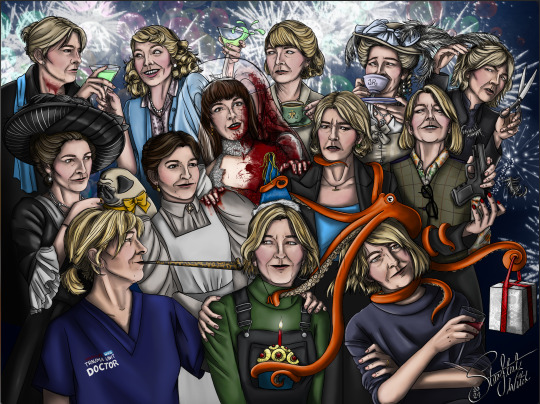
HAPPY BIRTHDAY TO THIS TALENTED BEAN! <3
#jemma redgrave#bernie wolfe#kate stewart#doctor who#kate lethbridge stewart#zoe evans#jill raymond#di jill raymond#eleanor bramwell#eve granger#amelia davenport#lady de courcy#diana markham#dream demon#silent witness#george grey#octopolis#francis#art#my art#my work#bramwell#holby city#cold blood#granchester#frankie
107 notes
·
View notes
Text
Lady Susan Readthrough Letters 39 & 40
Summary: Lady Susan hopes to meet Alicia again when the situation is more favourable (ie: when her husband kicks the bucket). She hates everyone, but is determined to fetch Frederica and make her marry Sir James. No more Mrs. Nice Lady Susan!
Lady de Courcy writes to her daughter, Reginald is home! Yay! She begs her daughter to visit with Frederica so they can try to get them married. After all this anxiety, it's time to party!
-+-
Your husband I abhor, Reginald I despise, and I am secure of never seeing either again. Have I not reason to rejoice? Mainwaring is more devoted to me than ever
Yay?
This event, if his wife live with you, it may be in your power to hasten. The violence of her feelings, which must wear her out, may be easily kept in irritation. I rely on your friendship for this.
Lady Susan kindly wishes for her friend to commit a little murder on her behalf. She didn't actually suggest poison but trying to depression and anxiety a woman to death is hardly better.
I am now satisfied that I never could have brought myself to marry Reginald
Well it's a good thing Lady Susan's decided this after the choice is gone!
I am tired of submitting my will to the caprices of others; of resigning my own judgment in deference to those to whom I owe no duty, and for whom I feel no respect. I have given up too much, have been too easily worked on
Lol! WHEN? She never actually changed her mind about anything. The whole time she's been determined to marry off Frederica and have an affair with Mainwaring. I guess it was really hard pretending to not be a coquette for a few weeks.
I love this line from Lady de Courcy, "This is the most joyful hour he has ever given us since the day of his birth." What a sad reflection on Reginald!
List of Reginald's Achievements in life:
Being born male.
Not marrying Lady Susan
Frederica runs much in my thoughts, and when Reginald has recovered his usual good spirits (as I trust he soon will) we will try to rob him of his heart once more, and I am full of hopes of seeing their hands joined at no great distance.
I am curious here why the Vernons want Frederica to marry Reginald so badly. Surely she is a better choice than Lady Susan, but why else? We know Lady Susan has blown through the entire family fortune, and she said her daughter needed to marry money, so it isn't for wealth reasons. I guess they just love Frederica and are worried that Reginald will chose someone terrible again if left to his own devices.
Which I kind of suspect might be true, lol.
#lady susan readthrough#lady susan vernon#lady susan#reginald de courcy#lady de courcy#catherine vernon#frederica vernon
14 notes
·
View notes
Photo


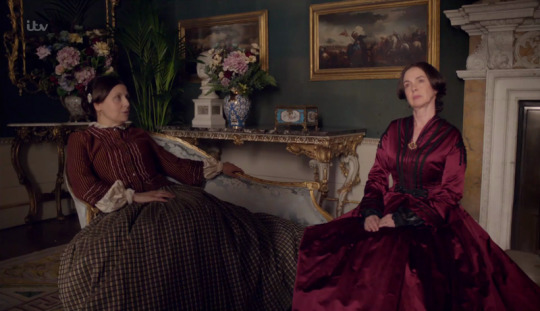
9 notes
·
View notes
Text
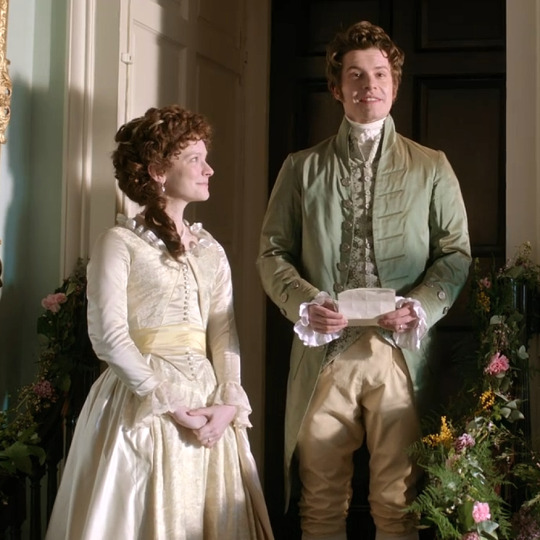
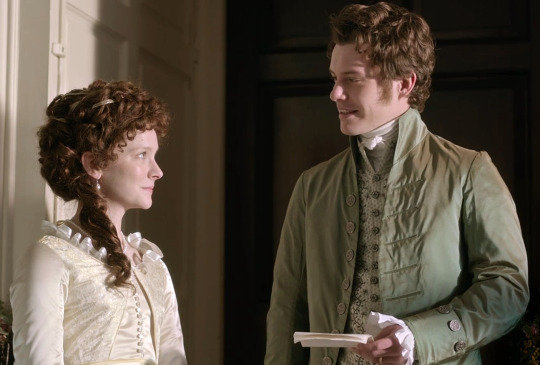
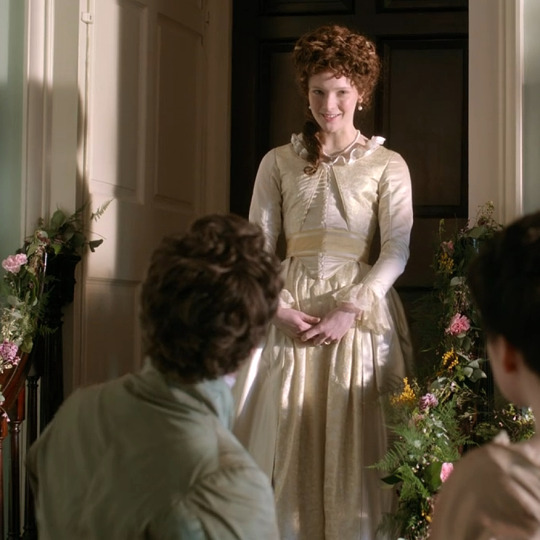
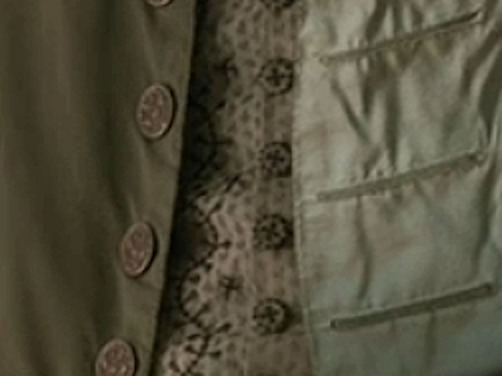
One Dress a Day Challenge
June: Weddings
Love and Friendship / Morfydd Clark as Frederica Vernon and Xavier Samuel as Reginald de Courcy
Frederica wears a cream or pale yellow gown with a yellow sash, pearl earrings, and a gold ribbon in her hair. Reginald wears a sage-green coat over an embroidered waistcoat of similar color, and buff-colored knee breeches.
It's a shame we don't get to see what Lady Susan and Sir James wore for their wedding, though!
#love and friendship#wedding costumes#morfydd clark#xavier samuel#movie costumes#one dress a day challenge#one dress a week challenge#period film#18th century costumes#1790s#1790s fashion#1790s style#18th century style#18th century fashion#2016 films#2016 movies#Eimer Ni Mhaoldomhnaigh#austen adaptations#lady susan
32 notes
·
View notes
Text

Quadrilles - practising at home: 1817 print (British Museum)
A passage from S.A. Cavell's Midshipman and Quarterdeck Boys in the British Navy, 1771-1831 on the importance of social dancing for young officers in the 19th century Royal Navy:
Many young gentlemen also began to ascribe greater importance to their participation in good society. Peter Cullen noted the anxiety of the Squirrel’s midshipmen when their captain refused an invitation to a ball given by the Earl of Kinsdale. Some of the more enterprising (and disobedient) among them found a way ashore and ‘had the honour of dancing with the Ladies de Courcy’. In 1807 able seaman Robert Wilson noted the elegance of several parties on board the Unité in which the officers and young gentlemen decorated the quarterdeck, arranged bands and entertainments, and organized refreshments in an effort to entertain local ladies and gentlemen with country dances. A bitter Charles Shaw chastised his parents for failing to send him a new uniform which caused him to miss an important social opportunity: ‘We have all been invited to a Ball at the British Consul’s at this place [Lisbon] but I was obliged to refused as I had no clothes to go in’.
Young gentlemen who paid excessive attention to the pursuits of genteel society risked the ire of more seasoned officers. Later in his career, Admiral Sir Thomas Byam Martin was peeved enough to comment: ‘The rivalry with midshipmen is no longer [over] smartness or professional duties, but in frivolous effeminacy, incompatible with what we wish and expect in the character of seamen.’ For most young gentlemen, however, the cultivation of an elegant manner in the company of polite society was essential to their personal and professional credit.
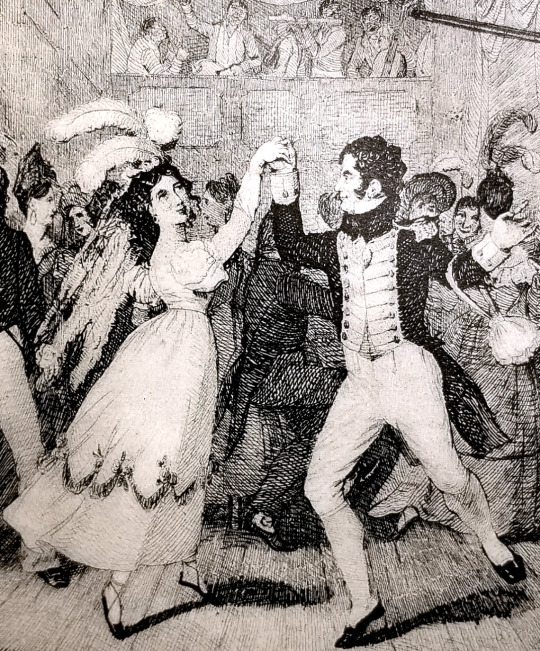
An 1837 illustration by Robert William Buss for Captain Frederick Marryat’s novel Peter Simple, showing Royal Navy officers and midshipmen dancing at a ball in Barbados in the early 19th century.
#midshipman monday#age of sail#naval history#social dancing#regency#royal navy#midshipmen#country dance#midshipmen and quarterdeck boys#samantha a cavell#robert william buss#frederick marryat#maritime history#dancing
95 notes
·
View notes
Text
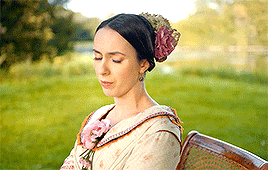
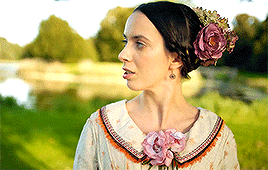
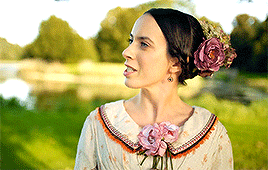

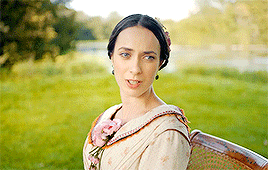
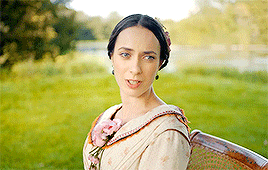
Kate O'Flynn as Lady Alexandrina de Courcy in Doctor Thorne
#fc: kate o'flynn#ch: alexandrina de courcy#source: doctor thorne#era: victorian#mine: gifset#period fc#perioddramaedit#perioddramagif
17 notes
·
View notes
Note
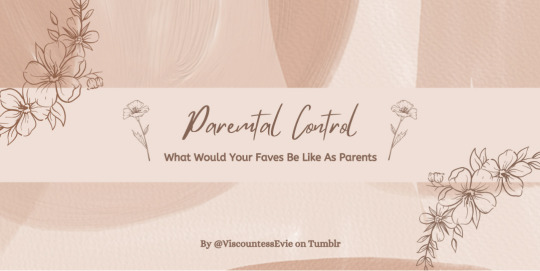
This question for your ocs Charlotte and Clairmont (not sure if you have any headcanons about them as parents but if so I would love to hear them)
I do actually have some HCs, and have written a bit of them as parents in my yet-to-be-published fic, 1846!
Charlotte Bridgerton and Lord Clairmont have at least 3 kids who are as follows:
Gabriel David Frederick De Courcy, Viscount Harville (named after David Basset, the Earl of Clyvedon, and Frederick Fitzalan)
Lady Caroline Alexandra De Courcy (named after Caroline Basset; goes by Alix)
Julian Hugo De Courcy
Since the De Courcys live primarily in London, they love being around the extended Bridgerton family and visiting with the kids.
Charlotte is the kind of parent who takes her kids seriously right from when they're little. Even when they ask difficult or weird questions, she tries to explain it to them in a way they understand rather than humoring them or dismissing them.
Clairmont was an only child to a single mother so he probably gets a kick out of having a full house. That being said he's literally thrown in the deep end when he has kids but luckily Frederick Fitzalan is a very present, very cool uncle in the kids' lives.
Charlotte is deeply involved in the education her daughter receives and makes sure it's not a lacking one like the one she received (aka the standard for aristocratic girls). She sends Alix to finish her education at Le Ruches in Fontainebleau, France. The headmistress Marie Souvestre was known for her progressive, feminist education that instilled critical thinking skills and rigorous standards (one of her later pupils would be Eleanor Roosevelt, who basically learned everything she knew from Marie).
5 notes
·
View notes
Note
In February 1960, Snowdon, then known as Antony Armstrong-Jones, became engaged to the Queen's sister, Princess Margaret, and they married on 6 May 1960 at Westminster Abbey. The ceremony was the first royal wedding to be broadcast on television. Despite the enthusiasm of the public, some critics disapproved of a commoner marrying into the royal family. The couple made their home in apartments at Kensington Palace. He was created Earl of Snowdon and Viscount Linley, of Nymans in the County of Sussex, on 6 October 1961. The couple had two children: David, 2nd Earl of Snowdon, born 3 November 1961, and Lady Sarah, born 1 May 1964.
The marriage began to collapse early and publicly; various causes may have been behind the failure. On her side there was a penchant for late-night partying, while on Snowdon's part there was undisguised sexual addiction ("'If it moves, he'll have it', was the summing-up of one close friend.") "'[T]o most of the girls who worked in the Pimlico Road studio, there seemed little doubt that Tony was gay'. To which Tony responds: 'I didn't fall in love with boys – but a few men have been in love with me.'" The authorised biography by Anne de Courcy (2008) reveals a series of affairs with women, including a 20-year relationship with his mistress Ann Hills, and that Armstrong-Jones did not deny that he was bisexual.
In his 2009 memoir, Redeeming Features, British interior designer Nicholas Haslam claimed that he had an affair with Snowdon before the latter's marriage to Princess Margaret and that Snowdon had also been the lover of Tom Parr, another leading interior designer.
The couple remained married for eighteen years. "They were both pretty strong-willed and accustomed to having their own way, so there were bound to be collisions", according to de Courcy. His work also consumed a great deal of time. "She expected her husband to be with her more, but one of Tony's strongest motivations was work." The marriage was accompanied by drugs, alcohol, and bizarre behaviour by both parties, such as his leaving lists of "things I hate about you" for the princess to find between the pages of books she read. According to biographer Sarah Bradford, one note read: "You look like a Jewish manicurist and I hate you". When high society palled for Snowdon, he would escape to a hideaway cottage with his lovers or on overseas photographic assignments. "Most people, including the Royal Family, took his side." Among Snowdon's lovers in the late 1960s was Lady Jacqueline Rufus-Isaacs, daughter of the 3rd Marquess of Reading. In spite of her own affairs, Margaret was said to be particularly upset when hearing about this woman. They separated in 1976, and the marriage ended in divorce in 1978
He fathered a child with his married friends wife...
That was a messy marriage.
6 notes
·
View notes
Text
Thanks to @magalis for the tag!
Last song I listened to: I’ve been mainlining podcasts recently (99pi, pchh, you’re wrong about, past present, so many more) and not listening much to music so I put my music on shuffle and landed first on Let’s Throw a Party by Sammy Rae & the Friends - a jam.
Last movie I watched: The Godfather II (1974). I am taking full advantage of unemployment and filling in some of the gaps in my Important Films knowledge. Surprised at how hot young Al Pacino and Robert De Niro were!
Last thing I read: I listened to The Husband Hunters by Anne de Courcy a little while back after finishing The Gilded Age and it was very interesting! Being a New York society lady in the late 19th century sounded like a nightmare! Being an English high society lady sounded like a hellish nightmare! Fun stuff. I’ve not been reading much of late but I have grand plans for an Edith Wharton summer. We’ll see how it goes.
I’ll tag @gendervilleusa @mbmused @alphacatsnest and @literarymagpie take or leave as you please. And obviously anyone else who wants to join in, please tell me what you’re listening to/watching/reading
#about me#tag games#nobody asked about tv but I love it so you’re getting it#currently watching: the obi-wan show (fine - I’m having fun) and ms. marvel (a delight) and business proposal (LOVE)#sammy rae & the friends#The Godfather II#the husband hunters
2 notes
·
View notes
Text
Principles and Propensities
read it on the AO3 at https://ift.tt/MxjHKXg
by scrimshaw
January 25 Prompt: Jane Austen novels, any two male characters from different novels, conversation at the gentlemen's club.
Words: 143, Chapters: 1/1, Language: English
Series: Part 10 of Three Sentence Ficathon 2022
Fandoms: Lady Susan - Jane Austen, Sense and Sensibility - Jane Austen
Rating: General Audiences
Warnings: No Archive Warnings Apply
Categories: Gen
Characters: Reginald De Courcy, Edward Ferrars
Relationships: Edward Ferrars/Lucy Steele
Additional Tags: 3 Sentence Ficathon, Actually 3 Sentences, Crossover, Secret Relationship
read it on the AO3 at https://ift.tt/MxjHKXg
1 note
·
View note
Photo
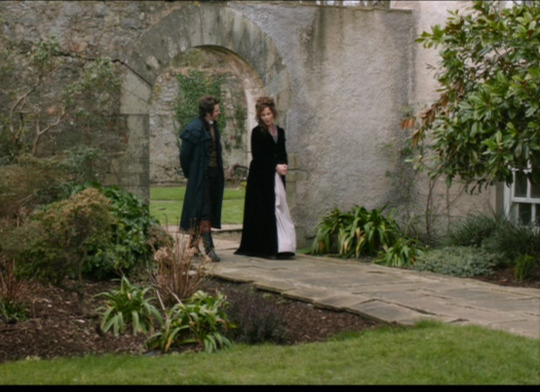
Admittedly I took this screencap mostly because I liked how it was framed, but it gives a glimpse at Reginald's fancy coat and Susan’s dark outerwear layer (I don’t think it’s a cloak, but I don’t know the actual term for it).
#reginald de courcy#lady susan vernon#love and friendship#austen costumes#jane austen#my screencap#in which there is a queue
1 note
·
View note
Text
Lady Susan Readthrough Letters 13 & 14
Summary: We find out that Sir Reginald read the previous letter from Catherine out loud to his wife, which is why he replied and not Lady De Courcy. Catherine's mother also sends Reginald's letter for his sister to read, though she says it isn't very comforting...
And it isn't! Reginald has written extensively but other than saying he won't marry Lady Susan because she's old, nothing else is hopeful. He thinks Catherine is prejudiced, Lady Susan is totally innocent, and the injured party in everything. Lol!
He explains away Lady Susan trying to prevent the marriage between Catherine and Charles Vernon; Lady Susan being seen as a bad mother; and her actions at Langford.
-+-
I know that Lady Susan in coming to Churchhill was governed only by the most honourable and amiable intentions; her prudence and economy are exemplary, her regard for Mr. Vernon equal even to his deserts; and her wish of obtaining my sister’s good opinion merits a better return than it has received.
Lady Susan is a master, I wish we could see her in action. How did she explain away all these disgusting truths about herself? Or does Reginald's brain just shut off when he's around her and she slips her lies right in?
I actually liked the movie for this, they had some of the "missing dialogue" but is it too much to ask to have it straight from Jane Austen's brain???
Reginald's letter is genuinely hilarious in that he thinks it will make his father feel better but it should make everyone feel much worse.
I blame myself severely for having so easily believed the slanderous tales invented by Charles Smith to the prejudice of Lady Susan, as I am now convinced how greatly they have traduced her.
He basically says that Lady Susan is perfectly innocent of everything and she's been horribly slandered. Everyone is wrong about her character except HE knows the truth, Reginald! The only one who has discernment!
I can have no other view in remaining with Lady Susan, than to enjoy for a short time (as you have yourself expressed it) the conversation of a woman of high intellectual powers.
And he's not in love with her, he just enjoys spending all his time with her, everyone needs to back off!
Oh sweet summer child...
I wish it was more satisfactory; but it seems written with such a determination to think well of Lady Susan, that his assurances as to marriage, &c., do not set my heart at ease.
Yes, you are wise de Courcy women.
9 notes
·
View notes
Photo
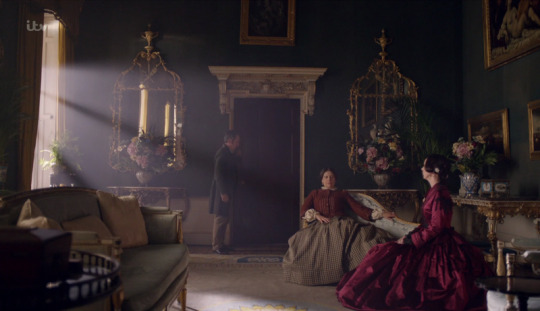
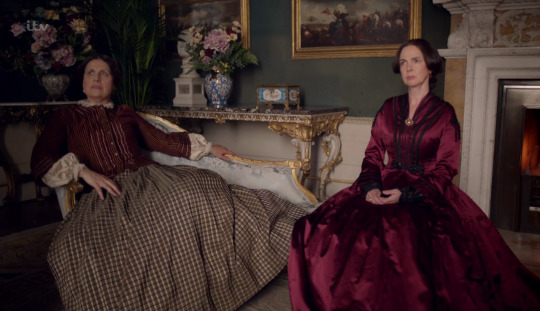

6 notes
·
View notes
Video
“She’s Lovely”
#What can i say#I'm on a period Jemma binge#and Lady De Courcy truer words have never been spoken#all of them though#My fave EllieBram#Jessie Humbleby#Lady Bertram#Eleanor Bramwell#jemma redgrave#actual light of my life#JRED#perfect human being#oh wait i left out evie wilcox oh wellllll next time
40 notes
·
View notes
Text
The Devereux Affair
"So, Mrs Devereux," the detective began. "Let's start off with the obvious question. Where were you at the time of your husband's death?"
"I don't know," the widow replied, meeting his gaze without flinching. There had been tears, earlier, but those had soon vanished into a lilac handkerchief. In the intervening hours there had been the household to manage, tomorrow's appointments to cancel, and now the police to entertain. Mr Devereux had been a busy man, and his wife had inherited that along with his estate. It hadn't left her time to mourn. "I don't believe you've told me when he died."
"Ah, very good," the detective smiled. "I see you're far too sharp for that old trick. The doctor ruled the time of death at six o'clock in the evening. He was asphyxiated, if I haven't mentioned that either."
"Your husband, not the doctor," the constable clarified. He was only here to take notes, and escort suspects in and out of the drawing room where they'd been stationed, but he couldn't help but add his own name to that script from time-to-time.
"It would have been a swift and largely painless death, if that brings any comfort."
"It does," she said, although she didn't return his smile. If anything, her forehead wore the faint impression of a frown. "Thank you for letting me know. In answer to your question, I would have been preparing for dinner. I am not sure of the exact timings, but I would have been in the dining room, talking to our cook."
"The cook being Madame de Courcy?"
"That's right. She will be able to vouch for me. I can vouch for her, if it comes to that. But there were a number of other individuals present in the house, any one of which might have had the opportunity."
"Yes, let's get on to them," the detective agreed. "Do you know your husband's schedule for the afternoon?"
"Of course," she said. "The housekeeper, Miss Mortimer, will have met with him after lunch to discuss household matters for the coming week. Then the new chamber maid, Miss Clifford, would have come to clean, and the laundry maid, Miss Warren, to replace his bedsheets and shirts. Oh, and he had a meeting with Miss Glanville, who works in the stables. He liked to enquire about the health of the horses."
"All women," the constable remarked.
"Women can kill as well as men," the detective reminded him, before turning back to Mrs Devereux. "Thank you for confirming our list of suspects. It matches what we have heard from your staff. We have also spoken to each of these ladies in turn."
"Well, naturally," she said. "May I ask how those conversations went? Were you able to unveil a motive?"
"Only for all four of them," he replied. "It is largely the same for each of them... but maybe you will not wish to hear?"
"If it is pertinent to my husband's murder, I am afraid I must insist upon hearing," she told him. "Whether it is pleasant to my ears or not."
"Very well," the detective agreed, with a gentle nod of his head. "Mrs Devereux, I regret to be the bearer of more bad news, but your husband was having an affair."
"Oh," she blinked. "With whom? Miss Mortimer?"
"With Miss Mortimer," he confirmed. "And with Miss Glanville and Miss Warren, at least historically. It seems that he broke the last of those off upon meeting Miss Mortimer, but I am unsure of the order. Oh, and Miss Clifford confessed that he had been making romantic overtures towards her in recent weeks."
"He was having affairs with all of them?"
"Largely one at a time," the constable clarified. "If that makes any difference. It seems your husband was a serial adulterer, rather than a particularly polygamous one."
"I am sorry," the detective said, apologising for his colleague as much for his own part in delivering the news. "Again, I regret to ask this, but had the two of you... grown apart, of late?"
She bristled at that. "Perhaps. I thought that he was just busy. Perhaps he was, but not in the sense I had thought. Well, it seems like you have plenty of motives to work with. A few old flames, turned into bitter ash. Or perhaps Miss Clifford has spurned his advances, and needed an escape."
"You have the same motive," he reminded her. "If he had moved on from each of them, he moved on from you first. On top of that, you are also in line to inherit from his death. They were due nothing."
"Only what I already enjoyed as his wife," Mrs Devereux replied. "I already had full access to the estate. All his death has done is deprive me of my husband, and left me with his duties to manage it all. Believe me, that is no inheritance."
"Onto the other suspects, then?" The detective made a show of flipping through his notes. "All said that he was hale and healthy when they left him. The room seems cleaned, the sheets fresh. Miss Glanville would have been the last to see him, so she would seem to vindicate those who came before her."
"And leave herself as the only suspect?"
"Not necessarily," he said, although she looked confused at that. "But let's dive in means and opportunity later. For now, we are discussing their motives. Constable?"
"We checked all of their bags," the constable chimed in. "They were stuffed with stolen silverware, heirlooms, that sort of thing. Every one of them was hoping to take home a souvenir from your husband's death. Miss Warren had even removed his cufflinks."
"Vultures," Mrs Devereux shuddered.
"Magpies," the detective corrected. "They all denied it at first, of course. Told us that they were gifts. I take it that you weren't aware of any decision to reward the household staff?"
"No."
"No. But then, you weren't aware of his relationship with these women." He sat back in his chair. "Still, if they were lying about this, any number of them could have been lying about seeing him alive. They might have found him slumped in that armchair and neglected to raise the alarm, taking the opportunity to fill their pockets and leaving that honour to the next visitor."
"Right," she said. "Sorry, you said at first. What changed?"
"Well, the prospect of their lies threw everything else into question. We suspected that, if they had lied about seeing him alive, separately or together, the time of death may have been far earlier. We asked for further tests, and do you know what the doctor found?"
"There is no need for games, detective," Mrs Devereux said coldly. "I am a widow in mourning. If you have some insight to share on the manner of my husband's death, I would prefer you simply tell me."
"Very well," the detective replied, those protests acknowledged with a deferential bow of his head. "The tests revealed that he was poisoned."
"Poisoned?" Now her brow creased, although the doubt in her eyes seemed, if anything, to clear. "I thought you said he was asphyxiated?"
"There are many ways to deprive a man of oxygen. In this case, he was suffocated from the inside. The doctor confirmed that he would have died in the early afternoon, towards the end of Miss Mortimer's visit."
"I see," she said. "That would make her the prime suspect, would it not? In place of Miss Glanville?"
"Her or Madame de Courcy," the detective corrected. "As we understand it, he died shortly after finishing his lunch. A cook has many opportunities to poison her master."
"Three a day," the constable added. "Perhaps more, if he was the peckish sort. Personally, I'm rather partial to a mid-morning snack."
"I have already spoken for Madame de Courcy," Mrs Devereux reminded the detective - ignoring his assistant, which was probably for the best.
"For her whereabouts," the detective noted. "Although I suppose that poison doesn't require presence. For a cook, it presents quite the French window of opportunity."
"I suppose it does." Mrs Devereux paused for a moment. "But if you suspect her of poisoning his meal at lunch-time, I would suggest that is unlikely to be the case. My husband and I ate soup from the same tureen before retiring to separate rooms, and I remain alive. But he drinks whiskey from a decanter in his study, and that could have been poisoned by any of the other staff who attend him throughout the day, including Miss Mortimer this afternoon."
"Let us return to the other staff," the detective agreed. "At first, I had said, as you were right to notice. Well, after we had uncovered their loot, and demonstrated that they had all seen your husband dead, they became more talkative."
"Of course they did. What did they have to say for themselves?"
"They admitted to the theft, those earlier lies washed away. But none admitted to the murder. If anything, they seemed equally surprised to learn of the poisoning. According to them, they thought he had collapsed of natural causes. That does not seem an unreasonable assumption, given that he was neither young nor in particularly robust health, and the doctor said the poison left no symptoms."
"Other than his death," the constable added.
"Yes."
"Mr Devereux's death, not the doctor's."
"Yes." The detective held back a sigh at the latest inane interruption from his subordinate - he often wondered where his colleagues found these people, and how on earth they came to hire them for such sensitive work. He would tell the young man to show more respect to the grieving widow, if he didn't already know what she had done. "Which explains why none of them summoned the police, and thought their pilfering of valuables would go unnoticed. On that topic, I understand that you are the one who alerted us to his death?"
"In a manner of speaking. When Henry didn't emerge for dinner, I sent one of the maids to look in on him, but he couldn’t be roused. We didn't know what else to do."
The detective nodded. It was all very reasonable. But where he would usually find it suspicious that the other women had kept quiet, covering up a murder being a classic behaviour of murderers, that was understandable where the death had been made to look like natural causes. In those cases, it was those who reported the death who were suspicious. Those who knew that foul play was afoot.
"With that revelation, the truth emerged. They had no taste for lies once they learnt they might be sheltering a murderer. Miss Mortimer confessed she had seen him die, suddenly collapsing in his chair, in what she told us seemed to be some sort of attack. She rushed to help him, but it was all over before she could react."
"Of course she did." Mrs Devereux's words were heavy with scorn. "Is this the truth, or just her latest version of events? Have you fallen for one lie after the last?"
He held up a hand to silence her. "Please, allow me to finish. All will be revealed in time."
"As you wish." She didn't look happy at that, but settled back down into her seat. Were she a bird, Mrs Devereux would have preened her ruffled feathers back into place. As it was, she made do with a cigarette, and a dismissive wave of her own hand. "Go on, then."
"Where was I?" He made another point of checking his notes, for her annoyance as much as anything else. "At first, Miss Mortimer hadn't known what to do. She was distraught, to hear her tell it: she had cared for him, and it would have been a shock even if she hadn't.
"But then her mind turned to her own life. Without him, she worried you would have no interest in keeping her on. Her post had come before the affair, and served as the starting point, but it was also how he looked after them, afterwards. Even those he had moved on from. Miss Mortimer was due to inherit nothing from her years of companionship, and so she decided to safeguard her own future.
"When Miss Clifford arrived, she found her colleague in distress. She was more relieved at your husband's death, having no attachment to the post and afraid of having to reject her employer, but that faded into empathy. She comforted Miss Mortimer in her grief, and chose to protect her lie. Together, they cleaned the room, and she took another token: simply to make her complicit. The price of ensuring her silence."
"One for sorrow, two for joy," the constable said. Whatever that meant.
"It was a similar story for the other two. Did you know your husband had sired illegitimate children with both of them, a girl and a boy?"
Mrs Devereux shook her head, motioning sarcastically that her lips were sealed. But not enough that she couldn't blow a cloud of smoke in his direction.
"As with Miss Mortimer, he had been funding their upbringing through these jobs, and so they sought to preserve his funding after his death. They also seemed afraid of what you might do. I suppose they suspected you knew, or would find out, about their true relationship.
"They found the other two, and told them - lest they report it and suspect them. They agreed to take part of a similar deal. It took a while for us to get the whole story, but eventually all recanted. They all saw him dead, and neglected to report it at the time. The doctor's verdict was correct."
"Is that it?" she asked. "May I speak now?"
"To your heart's content."
"It sounds like you found they were all in it together. Any one of those four women could be my husband's killer, or more than one could have conspired to commit the evil act together. It sounds like Miss Clifford in particular had a motive. The others may say they were afraid for their futures now that he was gone, but how can you trust a known liar? They each had their own reasons to hate him, and clearly had an alternative source of funding lined up."
"It does sound like that, doesn't it?" The detective turned to his colleague. "Do you want to tell her, or shall I?"
"I had the pleasure of interviewing Madame de Courcy," the constable said. "Unfortunately, she wasn't quite as sharp in the face of the same trick."
"What do you mean?"
"When I asked her where she was at the time of your husband's death, she told us that you were meeting after lunch. As if she knew he had passed earlier, when at this stage we were firmly under the impression it had not been until after Miss Glanville had left - swearing he was still alive, and that she had regaled him with stories of a new filly."
"She was more likely to have spoken of her son," the detective added. "We suspect that he kept these appointments to check in on the children as much as anything else."
"So Madame de Courcy was right, and you were wrong," Mrs Devereux said. "A peculiar cause for pride. Or do I misread your expression?"
"Satisfaction, perhaps," the detective conceded. "But it is unfortunate for you."
"And why would that be?"
"Because you no longer have an alibi."
"On the contrary," she said. "It seems that Madame de Courcy has accounted for my whereabouts up until the time of death, as I have done for hers."
"You said you had met just before dinner, well after the poison had taken hold."
"Did I?" She held that glassy stare. "Perhaps you are mistake. Perhaps I was. Either way, it is easily done. We met just after lunch, as Madame de Courcy says. She did not poison the soup, and she will have seen that I was equally innocent, and we remained in each other's company until after the body was found."
"Perhaps you really did meet after lunch," the detective continued. "Even if only to clear away the evidence, and rehearse your stories, safe in the knowledge you would vouch for each other. You say you ate from the same dish as your husband, and she says that she watched, but you would have had plenty of opportunity together. Perhaps he took pepper with his soup, and you did not. You would know better than us."
"It seems that there is little you do know. Only wild accusations."
"It's true that our profile of the crime is not complete," he confessed. "We are also not yet able to discern why Madame de Courcy abetted you. Perhaps you were also having an affair? That would bring a pleasing symmetry to the case: two groups of conspirators, each united by infidelity."
"As I said," Mrs Devereux stared him down. "Wild accusations, with a complete absence of proof."
"Proof lies in the absences," the detective told her. "The lacunae between the facts we are able to confirm, the gaps in the puzzle, the pieces that don't fit. You are unfortunate, in this case, in that every single suspect has lied to us. Particularly as the others were far better at co-ordinating.
"If their lie had been exposed first, and the earlier time of death was known, you and Madame de Courcy could have held your agreement to serve as one another's alibi. I imagine having arranged the murder together, it was a simple matter to agree on that. But where others have lied first, it can be devilishly tough to keep a story straight. Even the grains of truth may expose you, if we have swallowed a lie from elsewhere.
"Sadly for you and Madame de Courcy, they held the wool over our eyes just long enough for her own, accurate, knowledge to be revealed. In all my years in this role, this may be the first case I have solved by virtue of my ignorance. A suspect condemned, in a way, for telling the truth, simply because they were the only one to know it."
"You have solved nothing," Mrs Devereux maintained.
"No? If the two of you were working together, neither of you have any alibi, and you have the strongest opportunity to have administered the poison. It is a rather obvious method, looking back at it, for all your claims about a whisky after lunch. We found no evidence of that, by the way. Perhaps you should have left him a little more time.
"I can only imagine you must have hoped it looked like suffocation. In fact, I must confess that it did. Were it not for the confusion over times, and the web of lies woven by the other suspects, we would never have asked the doctor to dig deeper. In that case, we would have been forced to point the finger at Miss Mortimer, who lied about him being alive, and could just as easily have lied to young Miss Clifford when she found her.
"Or perhaps you had hoped Miss Clifford would be caught with the body, new and without allies, having received unwanted advances from the deceased, and not known what to do. Perhaps your husband just went particularly heavy on the pepper today. The time between their visits would also have cast them both as suspects. Meanwhile you had certainly strangled nobody, remaining downstairs with your fellow poisoner.
"How must you have felt when no cry was raised? Enough to send somebody to check on him ahead of dinner, knowing that his schedule for the day was exhausted, and if he was found dead in the evening you would have no protection? But Madame de Courcy knew that he was killed far earlier, despite what everybody else said, before even we knew. How else might she have known that?"
"She could have heard the others talking about seeing him dead, and assumed they would have reported the truth. Have you considered that, or are you part of their conspiracy as well? How much silver have you taken on your search of our home?"
"There is no need for games, Mrs Devereux." the detective said coldly, running out of patience. "I have heard it all before. I have worked many murders across a long career, and your husband's is the latest in a long line I have solved. If you have some insight to share on the manner of his death, I would prefer you simply tell me now."
That humbled her to some extent. Still she met his gaze, but the cigarette began to tremble in her fingers, dropping ash onto the carpet. "It was her idea. She poisoned him. I only agreed to protect her."
"I don't believe that for a second," he told her. "You are not an unimaginative liar, I will give you that, but you are sorely lacking in your delivery. I would limit myself to the rehearsed lines, if I were you."
"Fine," she said, that cold visage now breaking all at once, like a frozen river cracking in the spring. The icy stare gave way, exposing the dark water underneath. "What do you want me to say? I asked her to do it."
"That may be closer to the truth. We will see what Madame de Courcy has to say. It is as with the other serving staff: one lie might conceal the truth, but two lies, when competing, almost always expose it in the gaps they leave between them."
"It's ironic, really," the constable said. "If your husband had been better at lying, this whole mess could have been avoided. I imagine even the effort of some discretion might have helped. It must have burned, to see his affairs flaunted like this, kept on as your own staff, underneath your very nose."
"Yes," she said, and now the tears came in abundance. "It did."
9 notes
·
View notes
Photo


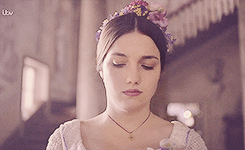
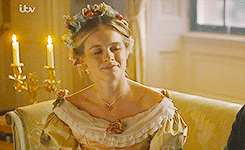


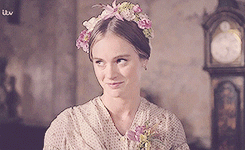
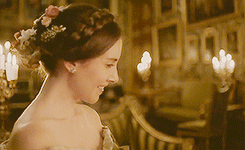


Doctor Thorne;flowers in your hair [2/2]
#perioddramaedit#doctor thorne#period drama#mary thorne#lady augusta gresham#lady beatrice gresham#lady alexandrina de courcy#miss dunstable#martha dunstable#stefanie martini#gwyneth keyworth#nell barlow#cressida bonas#kate o'flynn#flower crown#this was an attempt at colouring#juliaplayswithphotoshop#*#weloveperioddrama
304 notes
·
View notes